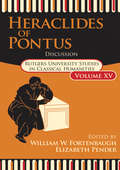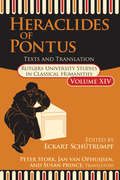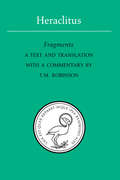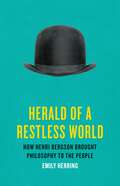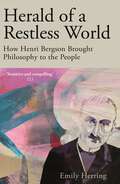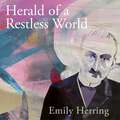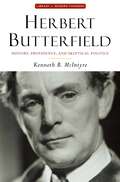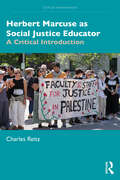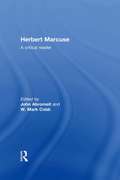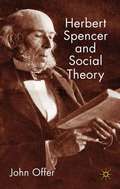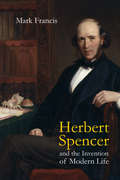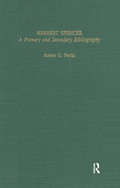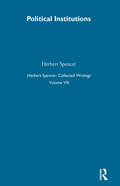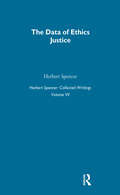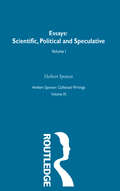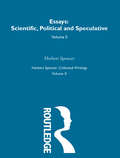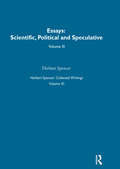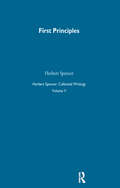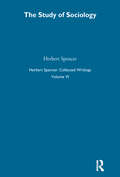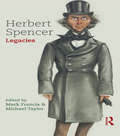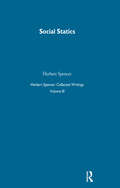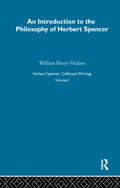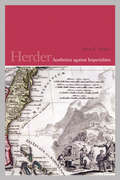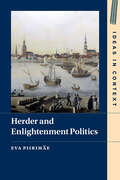- Table View
- List View
Heraclides of Pontus: Discussion (Rutgers University Studies in Classical Humanities)
by William W. Fortenbaugh Elizabeth PenderHeraclides of Pontus hailed from the shores of the Black Sea. He studied with Aristotle in Plato's Academy, and became a respected member of that school. During Plato's third trip to Sicily, Heraclides served as head of the Academy and was almost elected its head on the death of Speusippus.Heraclides' interests were diverse. He wrote on the movements of the planets and the basic matter of the universe. He adopted a materialistic theory of soul, which he considered immortal and subject to reincarnation. He discussed pleasure, and like Aristotle, he commented on the Homeric poems. In addition, he concerned himself with religion, music and medical issues. None of Heraclides' works have survived intact, but in antiquity his dialogues were much admired and often pillaged for sententiae and the like.The contributions presented here comment on Heraclides' life and thought. They include La Tradizione Papirologica di Eraclide Pontico by Tiziano Dorandi, Heraclides' Intellectual Context by Jorgen Mejer, and Heraclides of Pontus and the Philosophical Dialogue by Matthew Fox. There is also discussion of Heraclides' understanding of pleasure and of the human soul: Heraclides on Pleasure by Eckart Schutrumpf and Heraclides on the Soul and Its Ancient Readers by Inna Kupreeva. In addition, there are essays that address Heraclides' physics and astronomical theories: Unjointed Masses: A Note on Heraclides Physical Theory by Robert W. Sharples; Heliocentrism in or out of Heraclides by Paul T. Keyser, The Reception of Heraclides' Theory of the Rotation of the Earth from Posidonius to Simplicius: Texts, Contexts and Continuities by Robert B. Todd and Alan C. Bowen, and Heraclides of Pontus on the Motions of Venus and Mercury by Alan C. Bowen and Robert B. Todd. Finally, there are essays that view Heraclides from the stand point of ancient medicine, literary criticism and musical theory: Heraclides on Diseases and on the Woman Who Did Not Breathe by
Heraclides of Pontus: Texts, Translation, and Discussion (Rutgers University Studies In Classical Humanities Ser.)
by Eckart SchutrumpfHeraclides of Pontus hailed from the shores of the Black Sea. He studied with Aristotle in Plato's Academy, and became a respected member of that school. During Plato's third trip to Sicily, Heraclides served as head of the Academy and was almost elected its head on the death of Speusippus. His interests were diverse. He wrote on the movements of the planets and the basic matter of the universe. He adopted a materialistic theory of soul, which he considered immortal and subject to reincarnation. He discussed pleasure, and like Aristotle, he commented on the Homeric poems. In addition, he concerned himself with religion, music, and medical issues. None of Heraclides' works have survived intact, but in antiquity his dialogues were much admired and often pillaged for sententiae and the like. The volume contains a new edition of the sources for Heraclides' life and thought. The text is by Eckart Schutrumpf and the translation by Peter Stork, Jan van Ophuijsen, and Susan Prince. The discussion of the sources includes contributions by twelve scholars: "La Tradizione Papirologica di Eraclide Pontico" by Tiziano Dorandi; "Heraclides' Intellectual Context" by Jorgen Mejer; "Heraclides of Pontus and the Philosophical Dialogue" by Matthew Fox; "Heraclides on Pleasure" by Eckart Schutrumpf; "Heraclides on the Soul and Its Ancient Readers" by Inna Kupreeva; "Unjointed Masses: A Note on Heraclides Physical Theory" by Robert W. Sharples; "Heliocentrism in or out of Heraclides" by Paul T. Keyser; "The Reception of Heraclides' Theory of the Rotation of the Earth from Posidonius to Simplicius: Texts, Contexts and Continuities" by Robert B. Todd and Alan C. Bowen; "Heraclides of Pontus on the Motions of Venus and Mercury by Alan C. Bowen and Robert B. Todd; "The Woman Not Breathing" by Philip van der Eijk; "Heraclides of Pontus on Homer" by Malcolm Heath; and "Heraclides and Musical History" by Andrew Barker.
Heraclitus
by T. M. RobinsonThe Phoenix Pre-Socratic series is designed for modern students of the Pre-Socratic philosophers. This volume provides the Greek text of Heraclitus with a new, facing page translation together with a commentary outlining the main problems of interpretation and the philosophical issues raised by Heraclitus' work. The volume also contains an English translation of substantial material from the ancient testimonia concerning Heraclitus' life and teaching, and offers selective bibliographic guidance.While much of the commentary follows lines of interpretation that have won general acceptance, it differs from many in its claim that the logos of which Heraclitus speaks in fragments 1, 2 and 50 means, essentially, 'statement.' This statement, uttered in words by Heraclitus, reflects that statement everlastingly uttered by the cosmos itself, which descriptively tells of how things are and prescriptively lays don patterns of cosmic activity that serve as the basis for human laws (fragment 114).
Herald of a Restless World: How Henri Bergson Brought Philosophy to the People
by Emily HerringThe first English-language biography of Henri Bergson, the French philosopher who defined individual creativity and transformed twentieth-century thought—a &“fascinating biography and magnificent revival of this brilliant thinker&” (Skye Cleary, author of How to Be Authentic) At the dawn of the twentieth century, Henri Bergson (1859–1941) became the most famous philosopher on earth. Where prior thinkers sketched out a deterministic, predictable universe, he asserted the transformative power of consciousness and creativity. An international celebrity, he made headlines around the world debating luminaries like Bertrand Russell and Albert Einstein about free will and time. The vision of creative evolution and freedom he presented was so disruptive that the New York Times branded him &“the most dangerous man in the world.&” In Herald of a Restless World, Emily Herring recovers how Bergson captivated a society in flux. She shows how his celebration of the time-bending uniqueness of individual experience struck a chord with those shaken by modern technological and social change. Long after he faded from public view, his insights into memory, time, laughter, and creativity continue to shape how we see the world around us. Herald of a Restless World is an electrifying portrait of a singular intellect. Bergson&’s extraordinary insight into life&’s fundamental questions remains urgent and relevant to this day.
Herald of a Restless World: How Henri Bergson Brought Philosophy to the People
by Emily HerringAs heard on Radio 4's Free ThinkingHenri Bergson, the French philosopher who defined individual creativity and transformed twentieth-century thought. At the dawn of the twentieth century, Henri Bergson became the most famous philosopher on earth. Where prior thinkers sketched out a predictable universe, he asserted the transformative power of consciousness and creativity. An international celebrity, he made headlines around the world debating luminaries like Bertrand Russell and Albert Einstein about free will and time. The vision of creative evolution and freedom he presented was so disruptive that the New York Times branded him "the most dangerous man in the world." In the first English-language biography of Bergson, Emily Herring traces how his celebration of the time-bending uniqueness of individual experience struck a chord with those shaken by modern technological and social change. Bergson captivated a society in flux like no other. Long after he faded from public view, his insights into memory, time, joy and creativity continue to shape our perceptions to this day. Herald of a Restless World is an electrifying portrait of a singular intellect.
Herald of a Restless World: How Henri Bergson Brought Philosophy to the People
by Emily HerringAs heard on Radio 4's Free ThinkingHenri Bergson, the French philosopher who defined individual creativity and transformed twentieth-century thought. At the dawn of the twentieth century, Henri Bergson became the most famous philosopher on earth. Where prior thinkers sketched out a predictable universe, he asserted the transformative power of consciousness and creativity. An international celebrity, he made headlines around the world debating luminaries like Bertrand Russell and Albert Einstein about free will and time. The vision of creative evolution and freedom he presented was so disruptive that the New York Times branded him "the most dangerous man in the world." In the first English-language biography of Bergson, Emily Herring traces how his celebration of the time-bending uniqueness of individual experience struck a chord with those shaken by modern technological and social change. Bergson captivated a society in flux like no other. Long after he faded from public view, his insights into memory, time, joy and creativity continue to shape our perceptions to this day. Herald of a Restless World is an electrifying portrait of a singular intellect.
Herbert Butterfield: History, Providence, and Skeptical Politics (Library of Modern Thinkers)
by Kenneth B. McIntyre"The most original historian of his generation." That is how the celebrated British academic Noel Annan described Herbert Butterfield (1900–1979), a profound and prolific writer who made important contributions as both a public and academic historian. In this authoritative and accessible intellectual biography, Kenneth B. McIntyre explores the extraordinary range of Butterfield's work. He shows why the small book The Whig Interpretation of History (1931) achieved such large influence; Butterfield, he demonstrates, has profoundly shaped American and European historiography by highlighting the distortions that occur when historians interpret the past merely as steps along the way toward the glorious present. But McIntyre delves much deeper, examining everything from Butterfield's lectures on history, historiography, and Christianity, to his warnings about the dangers of hubris in international affairs, to his essays on the origins of modern science, which basically created the modern discipline of the history of science. This latest volume in the acclaimed Library of Modern Thinkers series helps us understand a prescient and insightful thinker who challenged dominant currents in history, historiography, international relations, and politics.
Herbert Marcuse as Social Justice Educator: A Critical Introduction (Critical Interventions)
by Charles ReitzDemonstrating the continued relevance of Marcuse’s work, Herbert Marcuse as Social Justice Educator details how his teachings remain a countervailing force to the conventional wisdom in intellectual and political matters today.By drawing on Marcuse’s critical analysis of the political economy, a profound concern for environmental issues, and an explicit critique of educational philosophy, this book illuminates not only the content and contours of Marcuse’s work but its importance for developing critical social scientific thinking and theoretical insight into contemporary issues such as genocide and ecocide, fascism and democratic crises, political economy and social inequality, and the role of culture and media in forming compliant consumer-citizens.From Charles Reitz, a prominent leader in Marcuse studies, this book will be an essential guide for instructors, students, and learners in sociology, social theory, political science, and environmental studies.
Herbert Marcuse: A Critical Reader
by John Abromeit W. Mark CobbThe Legacy of Herbert Marcuse: A Critical Reader is a collection of brand new papers by seventeen Marcuse scholars, which provides a comprehensive reassessment of the relevance of Marcuse's critical theory at the beginning of the 21st century.Although best known for his reputation in critical theory, Herbert Marcuse's work has had impact on areas as diverse as politics, technology, aesthetics, psychoanalysis and ecology. This collection addresses the contemporary relevance of Marcuse's work in this broad variety of fields and from an international perspective. In Part One, veteran scholars of Marcuse and the Frankfurt school examine the legacy of various specific areas of Marcuse's thought, including the quest for radical subjectivity, the maternal ethic and the negative dialectics of imagination. Part Two focuses on a very new trend in Marcuse scholarship: the link between Marcuse's ideas and environmental thought. The third part of this collection is dedicated to the work of younger Marcuse scholars, with the aim of documenting Marcuse's reception among the next generation of critical theorists. The final section of the book contains recollections on Marcuse's person rather than his critical theory, including an informative look back over his life by his son, Peter.
Herbert Spencer and Social Theory
by John OfferHerbert Spencer remains a significant but poorly understood figure in 19th century intellectual life. His ideas on evolution ranged across the natural sciences and philosophy, and he pioneered new ideas in psychology and sociology. This book comprehensively examines his work and strips away common misconceptions about his sociology.
Herbert Spencer and the Invention of Modern Life
by Mark FrancisThe English philosopher Herbert Spencer (1820 - 1903) was a colossus of the Victorian age. His works ranked alongside those of Darwin and Marx in the development of disciplines as wide ranging as sociology, anthropology, political theory, philosophy and psychology. In this acclaimed study of Spencer, the first for over thirty years and now available in paperback, Mark Francis provides an authoritative and meticulously researched intellectual biography of this remarkable man that dispels the plethora of misinformation surrounding Spencer and shines new light on the broader cultural history of the nineteenth century. In this major study of Spencer, the first for over thirty years, Mark Francis provides an authoritative and meticulously researched intellectual biography of this remarkable man. Using archival material and contemporary printed sources, Francis creates a fascinating portrait of a human being whose philosophical and scientific system was a unique attempt to explain modern life in all its biological, psychological and sociological forms. Herbert Spencer and the Invention of Modern Life fills what is perhaps the last big biographical gap in Victorian history. An exceptional work of scholarship it not only dispels the plethora of misinformation surrounding Spencer but shines new light on the broader cultural history of the nineteenth century. Elegantly written, provocative and rich in insight it will be required reading for all students of the period.
Herbert Spencer: A Primary and Secondary Bibliography
by Robert G. PerrinFirst published in 1993. Routledge is an imprint of Taylor & Francis, an informa company.
Herbert Spencer: Being Part V Of The Principles Of Sociology. (the Concluding Portion Of Vol
by Herbert SpencerHerbert Spencer (1820-1903) was regarded by the Victorians as the foremost philosopher of the age, the prophet of evolution at a time when the idea had gripped the popular imagination. Until recently Spencer's posthumous reputation rested almost excusively on his social and political thought, which has itself frequently been subject to serious misrepresentation. But historians of ideas now recognise that an acquaintance with Spencer's thought is essential for the proper understanding of many aspects of Victorian intellectual life, and the present selection is designed to answer this need. It provides a cross-section of Spencer's works from his more popular and approachable essays to a number of the volumes of the Synthetic Philosophy itself. Volume VIII, Political Institutions.
Herbert Spencer: Collected Writings
by Herbert SpencerHerbert Spencer (1820-1903) was regarded by the Victorians as the foremost philosopher of the age, the prophet of evolution at a time when the idea had gripped the popular imagination. Until recently Spencer's posthumous reputation rested almost excusively on his social and political thought, which has itself frequently been subject to serious misrepresentation. But historians of ideas now recognise that an acquaintance with Spencer's thought is essential for the proper understanding of many aspects of Victorian intellectual life, and the present selection is designed to answer this need. It provides a cross-section of Spencer's works from his more popular and approachable essays to a number of the volumes of the Synthetic Philosophy itself. Volume -The Data of Ethics Justice.
Herbert Spencer: Collected Writings
by Herbert SpencerHerbert Spencer (1820-1903) was regarded by the Victorians as the foremost philosopher of the age, the prophet of evolution at a time when the idea had gripped the popular imagination. Until recently Spencer's posthumous reputation rested almost excusively on his social and political thought, which has itself frequently been subject to serious misrepresentation. But historians of ideas now recognise that an acquaintance with Spencer's thought is essential for the proper understanding of many aspects of Victorian intellectual life, and the present selection is designed to answer this need. It provides a cross-section of Spencer's works from his more popular and approachable essays to a number of the volumes of the Synthetic Philosophy itself. This is Volume I.
Herbert Spencer: Collected Writings
by Herbert SpencerHerbert Spencer (1820-1903) was regarded by the Victorians as the foremost philosopher of the age, the prophet of evolution at a time when the idea had gripped the popular imagination. Until recently Spencer's posthumous reputation rested almost excusively on his social and political thought, which has itself frequently been subject to serious misrepresentation. But historians of ideas now recognise that an acquaintance with Spencer's thought is essential for the proper understanding of many aspects of Victorian intellectual life, and the present selection is designed to answer this need. It provides a cross-section of Spencer's works from his more popular and approachable essays to a number of the volumes of the Synthetic Philosophy itself. Volume IV: The Principles of Psychology.
Herbert Spencer: Collected Writings
by Herbert SpencerHerbert Spencer (1820-1903) was regarded by the Victorians as the foremost philosopher of the age, the prophet of evolution at a time when the idea had gripped the popular imagination. Until recently Spencer's posthumous reputation rested almost excusively on his social and political thought, which has itself frequently been subject to serious misrepresentation. But historians of ideas now recognise that an acquaintance with Spencer's thought is essential for the proper understanding of many aspects of Victorian intellectual life, and the present selection is designed to answer this need. It provides a cross-section of Spencer's works from his more popular and approachable essays to a number of the volumes of the Synthetic Philosophy itself. This is Volume II.
Herbert Spencer: Collected Writings
by Herbert SpencerHerbert Spencer (1820-1903) was regarded by the Victorians as the foremost philosopher of the age, the prophet of evolution at a time when the idea had gripped the popular imagination. Until recently Spencer's posthumous reputation rested almost excusively on his social and political thought, which has itself frequently been subject to serious misrepresentation. But historians of ideas now recognise that an acquaintance with Spencer's thought is essential for the proper understanding of many aspects of Victorian intellectual life, and the present selection is designed to answer this need. It provides a cross-section of Spencer's works from his more popular and approachable essays to a number of the volumes of the Synthetic Philosophy itself. Volume III.
Herbert Spencer: Collected Writings
by Herbert SpencerHerbert Spencer (1820-1903) was regarded by the Victorians as the foremost philosopher of the age, the prophet of evolution at a time when the idea had gripped the popular imagination. Until recently Spencer's posthumous reputation rested almost excusively on his social and political thought, which has itself frequently been subject to serious misrepresentation. But historians of ideas now recognise that an acquaintance with Spencer's thought is essential for the proper understanding of many aspects of Victorian intellectual life, and the present selection is designed to answer this need. It provides a cross-section of Spencer's works from his more popular and approachable essays to a number of the volumes of the Synthetic Philosophy itself. Volume V: First Principles.
Herbert Spencer: Collected Writings
by Herbert SpencerHerbert Spencer (1820-1903) was regarded by the Victorians as the foremost philosopher of the age, the prophet of evolution at a time when the idea had gripped the popular imagination. Until recently Spencer's posthumous reputation rested almost excusively on his social and political thought, which has itself frequently been subject to serious misrepresentation. But historians of ideas now recognise that an acquaintance with Spencer's thought is essential for the proper understanding of many aspects of Victorian intellectual life, and the present selection is designed to answer this need. It provides a cross-section of Spencer's works from his more popular and approachable essays to a number of the volumes of the Synthetic Philosophy itself. Volume VI The Study of Sociology.
Herbert Spencer: Herbert Spencer, 1820-1903 (Continuum Studies In British Philosophy Ser.)
by Mark Francis and Michael W. TaylorHerbert Spencer: Legacies explores and assesses the impact of the ideas and work of the great Victorian polymath Herbert Spencer across a wide range of disciplines. In the course of the essays a significant re-evaluation of his influence on Victorian and Edwardian thought is provided. Spencer's contribution to the fields of sociology, anthropology, psychology, biology and ecology are considered, alongside his influence on key figures in science and philosophy. The book brings together scholars from a wide range of disciplines to explore Spencer's nuanced and complex ideas and will be invaluable for historians of science and ideas, and all those interested in the intellectual culture of the late Victorian and Edwardian period. Contributors: Peter J. Bowler, James Elwick, Mark Francis, Bernard Lightman, Chris Renwick, Vanessa L. Ryan, John Skorupski, Michael W. Taylor, Stephen Tomlinson, and Jonathan H. Turner
Herbert Spencer: Or, The Conditions Essential To Human Happiness Specified, And The First Of Them Developed
by Herbert SpencerHerbert Spencer (1820-1903) was regarded by the Victorians as the foremost philosopher of the age, the prophet of evolution at a time when the idea had gripped the popular imagination. Until recently Spencer's posthumous reputation rested almost excusively on his social and political thought, which has itself frequently been subject to serious misrepresentation. But historians of ideas now recognise that an acquaintance with Spencer's thought is essential for the proper understanding of many aspects of Victorian intellectual life, and the present selection is designed to answer this need. It provides a cross-section of Spencer's works from his more popular and approachable essays to a number of the volumes of the Synthetic Philosophy itself. Volume III: Social Statics, Or the Conditions Essential to Human Happiness specified and then the fifst of them Developed.
Herbert Spencer: With A Biographical Sketch
by Herbert SpencerHerbert Spencer (1820-1903) was regarded by the Victorians as the foremost philosopher of the age, the prophet of evolution at a time when the idea had gripped the popular imagination. Until recently Spencer's posthumous reputation rested almost excusively on his social and political thought, which has itself frequently been subject to serious misrepresentation. But historians of ideas now recognise that an acquaintance with Spencer's thought is essential for the proper understanding of many aspects of Victorian intellectual life, and the present selection is designed to answer this need. It provides a cross-section of Spencer's works from his more popular and approachable essays to a number of the volumes of the Synthetic Philosophy itself. Volume I: An Introduction to the Philosophy of Herbert Spencer.
Herder
by John K. NoyesAmong his generation of intellectuals, the eighteenth-century German philosopher Johann Gottfried Herder is recognized both for his innovative philosophy of language and history and for his passionate criticism of racism, colonialism, and imperialism. A student of Immanuel Kant, Herder challenged the idea that anyone - even the philosophers of the Enlightenment - could have a monopoly on truth.In Herder: Aesthetics against Imperialism, John K. Noyes plumbs the connections between Herder's anti-imperialism, often acknowledged but rarely explored in depth, and his epistemological investigations. Noyes argues that Herder's anti-rationalist epistemology, his rejection of universal conceptions of truth, knowledge, and justice, constitutes the first attempt to establish not just a moral but an epistemological foundation for anti-imperialism. Engaging with the work of postcolonial theorists such Dipesh Chakrabarty and Gayatri Spivak, this book is a valuable reassessment of Enlightenment anti-imperialism that demonstrates Herder's continuing relevance to postcolonial studies today.
Herder and Enlightenment Politics (Ideas in Context #147)
by Eva PiirimäeJohann Gottfried Herder initiated the modern disciplines of philosophical anthropology and cultural history, including the study of popular culture. He is also remembered as a sharp critic of colonialism and imperialism. But what types of social, economic and political arrangements did Herder envision for modern European societies? Herder and Enlightenment Politics provides a radically new interpretation of Herder's political thought, situating his ideas in Enlightenment debates on modern patriotism, commerce and peace. By reconstructing Herder's engagement with Rousseau, Montesquieu, Abbt, Ferguson, Möser, Kant and many other contemporary authors, Eva Piirimäe shows that Herder was deeply interested in the potential for cultural, moral and political reform in Russia, Germany and Europe. Herder probed the foundations of modern liberty, community and peace, developing a distinctive understanding of human self-determination, natural sociability and modern patriotism as well as advocating a vision of Europe as a commercially and culturally interconnected community of peoples.
